
The Euro-Atlantic Partnership Council (EAPC) is a post–Cold War, North Atlantic Treaty Organization (NATO) institution. The EAPC is a multilateral forum created to improve relations between NATO and non-NATO countries in Europe and Central Asia. States meet to cooperate and discuss political and security issues. It was formed on 29 May 1997 at a Ministers’ meeting held in Sintra, Portugal, as the successor to the North Atlantic Cooperation Council (NACC), which was created in 1991.
The Atlantic Council is an American think tank in the field of international affairs, favoring Atlanticism, founded in 1961. It manages sixteen regional centers and functional programs related to international security and global economic prosperity. It is headquartered in Washington, D.C. It is a member of the Atlantic Treaty Association.
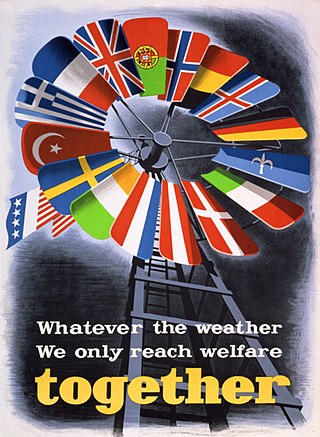
Atlanticism, also known as Transatlanticism, is the ideological belief in support of closer relationships between the peoples and governments in Northern America and in Europe on political, economic, and defense issues for the purpose of maintaining the security and prosperity of the participating countries and protect liberal democracy and the progressive values of an open society that unite them under multiculturalism. The term derives from the Atlantic Ocean, which is bordered by North America and Europe.
Criticism of the war on terror addresses the morals, ethics, efficiency, economics, as well as other issues surrounding the war on terror. It also touches upon criticism against the phrase itself, which was branded as a misnomer. The notion of a "war" against "terrorism" has proven highly contentious, with critics charging that participating governments exploited it to pursue long-standing policy/military objectives, reduce civil liberties, and infringe upon human rights. It is argued by critics that the term war is not appropriate in this context, since there is no identifiable enemy and that it is unlikely international terrorism can be brought to an end by military means.
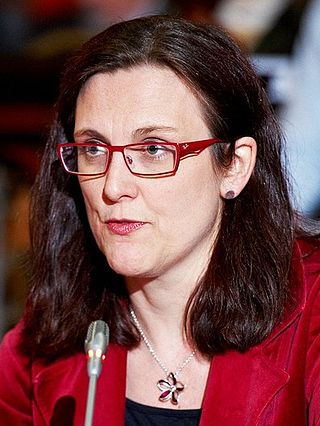
Anna Cecilia Malmström is a Swedish politician who served as European Commissioner for Trade from 2014 to 2019. She previously served as European Commissioner for Home Affairs from 2010 to 2014 and Minister for European Union Affairs from 2006 to 2010. She was a Member of the European Parliament (MEP) from Sweden from 1999 to 2006.

Transatlantic relations refer to the historic, cultural, political, economic and social relations between countries on both side of the Atlantic Ocean. Sometimes it specifically means relationships between the Anglophone North American countries, and particular European countries or organizations, although other meanings are possible.
The Westphalian system, also known as Westphalian sovereignty, is a principle in international law that each state has exclusive sovereignty over its territory. The principle developed in Europe after the Peace of Westphalia in 1648, based on the state theory of Jean Bodin and the natural law teachings of Hugo Grotius. It underlies the modern international system of sovereign states and is enshrined in the United Nations Charter, which states that "nothing ... shall authorize the United Nations to intervene in matters which are essentially within the domestic jurisdiction of any state."
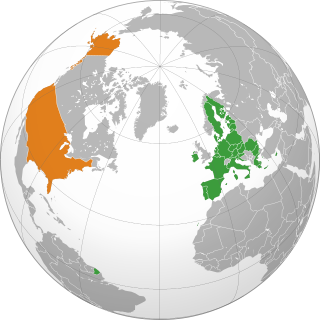
Relations between the European Union and the United States began in 1953, when US diplomats visited the European Coal and Steel Community in addition to the national governments of its six founding countries. The two parties share a good relationship which is strengthened by NATO, cooperation on trade, and shared values.

George D. Schwab is an American political scientist, editor, Holocaust survivor, and academic. He was the president of the National Committee on American Foreign Policy, an American non-partisan foreign policy think tank. He co-founded the organization in 1974 and served as its president from 1993 to 2015, and was the editor of its bimonthly journal, American Foreign Policy Interests.
The foreign policy of the Bill Clinton administration was of secondary concern to a president fixed on domestic policy. He relied chiefly on his two experienced Secretaries of State Warren Christopher (1993–1997) and Madeleine Albright (1997–2001), as well as Vice President Al Gore. The Cold War had ended and the Dissolution of the Soviet Union had taken place under his predecessor President George H. W. Bush, whom Clinton criticized for being too preoccupied with foreign affairs. The United States was the only remaining superpower, with a military strength far overshadowing the rest of the world. There were tensions with countries such as Iran and North Korea, but no visible threats. Clinton's main priority was always domestic affairs, especially economics. Foreign-policy was chiefly of interest to him in terms of promoting American trade. His administration signed more than 300 bilateral trade agreements. His emergencies had to do with humanitarian crises which raised the issue of American or NATO or United Nations interventions to protect civilians, or armed humanitarian intervention, as the result of civil war, state collapse, or oppressive governments.

John James Kirton is professor emeritus of political science and the director and founder of the G7 Research Group, director and founder of the G20 Research Group, founder and co-director of the Global Health Diplomacy Program, and founder and co-founder of the BRICS Research Group, based at University of Trinity College in the University of Toronto.

Henry D. Sokolski is the founder and executive director of the Nonproliferation Policy Education Center, a Washington-based think tank promoting a better understanding of strategic weapons proliferation issues among policymakers, scholars, and the media. He teaches as an adjunct professor at The Institute of World Politics in Washington, D.C., and at the University of Utah and has an appointment as Senior Fellow for Nuclear Security Studies at the University of California at San Diego, School of Global Policy and Strategy.
Alexander Moens is a professor of political science at Simon Fraser University in Vancouver and a Senior Fellow at the Fraser Institute in the Centre for Canadian-American Relations. He teaches American foreign policy and the political and security relations between Europe and North America. He is the author of The Foreign Policy of George W. Bush: Values, Strategy, Loyalty as well as Foreign Policy Under Carter.
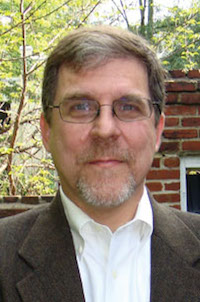
James S. Robbins is an American commentary writer for USA Today and Senior Fellow for National Security Affairs on the American Foreign Policy Council. He is the former Senior Editorial Writer for Foreign Affairs at the Washington Times, an author, political commentator and professor, with a focus on national security and foreign and military affairs. He also served as special assistant in the Office of the Secretary of Defense.
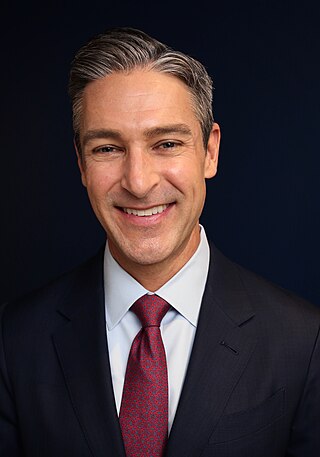
Damon M. Wilson is an American foreign policy expert and the President and CEO of the National Endowment for Democracy, an independent grant-making foundation supporting freedom and democracy around the world. From 2011 to 2021, he was the Executive Vice President at the Atlantic Council, a nonpartisan think tank focused on international cooperation. A former civil servant, Wilson served as Special Assistant to the President and Senior Director for European Affairs at the National Security Council during the second term of President George W. Bush.

Taras Kuzio is a Professor of Political Science at the National University of Kyiv-Mohyla Academy. His area of study is Ukrainian political, economic and security affairs.
Robert Jackson Alexander was an American political activist, writer, and academic who spent most of his professional career at Rutgers University. He is best remembered for his pioneering studies on the trade union movement in Latin America and dissident communist political parties, including ground-breaking monographs on the International Communist Right Opposition, Maoism, and the international Trotskyist movement.
Fathali M. Moghaddam is an Iranian-born psychologist, author, professor of psychology at Georgetown University and director of the Interdisciplinary Program in Cognitive Science (ICOS), Department of Government, Georgetown University.
James Forrest Rinehart was a Professor of International Relations at Troy University. In addition, since 2012, he has served as Dean of the College of Arts & Sciences. Previously, Rinehart was Associate Dean (2008–11), and Chair of the Department of Political Science (2001–08).
International relations since 1989 covers the main trends in world affairs in the post–Cold War era.










